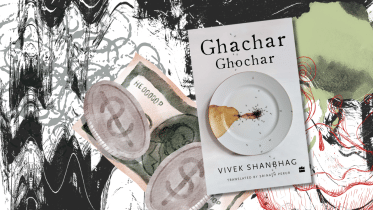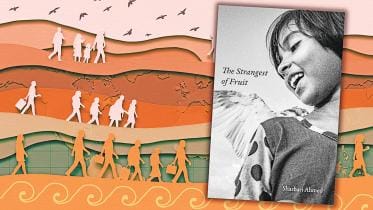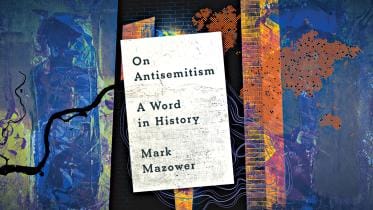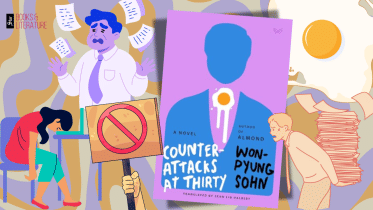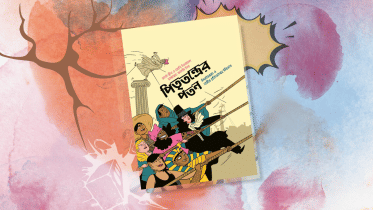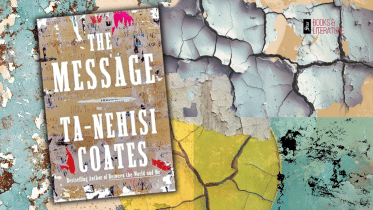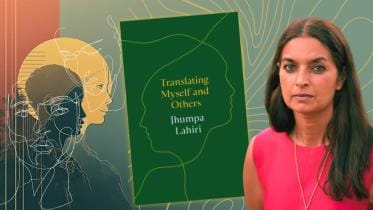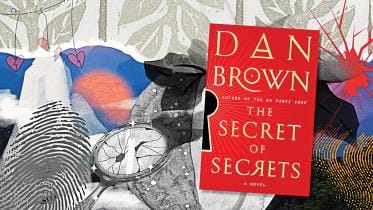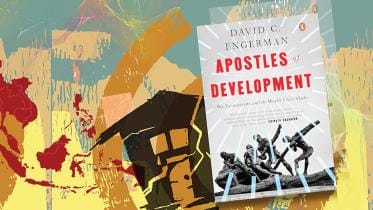book review
Cross and concrete: Christianity’s built contradictions
Twelve Churches succeeds in its ambitious goal of revealing Christianity's global complexity through architecture and human stories, embracing the deepest contested contradictions that add to the pageantry of religious faith in the modern world.
24 December 2025, 07:16 AM
A tangled knot of wealth and sin
The novella is written from the perspective of an unnamed narrator, who represents sloth. He is a nostalgic and unambitious man. Legally and on paper, he is the director of their family business, Sona Masala, although he does no actual work.
22 December 2025, 11:07 AM
Finding common ground: How ‘Bela and Lily’ celebrates friendship across cultures
For bilingual readers, especially for children of Bangladeshi immigrants, it is striking to see how organically English and Bangla words interact on the page
18 December 2025, 12:12 PM
All’s almost well
All’s Well circles one maddening question: what does pain need to look like before someone finally believes you? And how do you stop before it gets too discomfortable?
3 December 2025, 12:44 PM
Between home and elsewhere
Some books explain immigrant life through nostalgia. Others through big dramatic events. Sharbari Ahmed does neither in <I>The Strangest of Fruit</I>. Her stories focus on the quieter things like small humiliations, awkward encounters, the private wounds people carry, and the memories they don’t
26 November 2025, 18:00 PM
An inter-cultural romance
The author of this book is the protagonist of a charming inter-cultural romance. He is one of fewer than a handful of living Westerners who fortuitously fell in love with Bengali literature and made a distinguished career of teaching it—at the University of Chicago in his case.
26 November 2025, 18:00 PM
Contested words, painful genealogies
Buried beneath masses of mangled bodies of countless innocents slowly pulled from the shrapnel and debris, their remaining flesh torn in the extraction, lies a reflection of the world’s inhumanity.
19 November 2025, 18:00 PM
Growing up ordinary in a toxic work culture
Focusing on themes of systemic injustice, and resistance, Counterattack at Thirty is a captivating and timely read—perfect for anyone interested in personal narratives infused with keen social commentary.
14 November 2025, 09:55 AM
A graphic rebellion against patriarchy
We are living in the advancing era, mended meticulously with dreams and expectations. It is the era of new norms. And yet, a woman asking for the basic human rights will be scrutinised for standing up for herself.
12 November 2025, 18:00 PM
Poetry in short-hand
The idea of outsourcing the selection of poems to a fellow poet-publisher Dustin Pickering, lends the already published poems of Kiriti Sengupta another round of robust readership.
12 November 2025, 18:00 PM
Writing about writing, history, and Palestine
In The Message, Coates details several experiences from his travels to Senegal and Palestine, his correspondences with a teacher in South Carolina fighting against a school board’s push to ban books with topics deemed controversial, and his personal takeaways from these events.
12 November 2025, 11:41 AM
Between expectations and choice
Translation is a bridge to connect different cultures and their literatures. It’s a medium to reflect the gems of a country’s literature around the globe.
5 November 2025, 18:00 PM
A prayer for Mauritius
Written in deep striking prose, Saramandi lends her authorial voice to the changing dynamics of her life whose future is described as “a line that turned out to be a loop” similar to the fate of her homeland.
1 November 2025, 13:30 PM
From sacred art to consciousness: A leap too far
When Dan Brown finally returned in 2025 with The Secret of Secrets—the sixth Robert Langdon adventure—the world that devoured The Da Vinci Code (Doubleday, 2003) had mixed reactions to the story.
29 October 2025, 18:00 PM
A play within a space opera
When I first learned about Hamlet: Book One of the Post-ApocalypticSpace Shakespeare by American novelist Ted Neill, I was immediately intrigued. While not the first science fiction Shakespeare, Neill’s attempt to produce a complete series represents a noteworthy Shakespeare project. As of September 2025, Neill has published his version of Hamlet, Othello, and Twelfth Night with “many more” listed as planned. He appears to want to produce all 37 plays.
29 October 2025, 18:00 PM
Prelude, Puzzle and Premonition
Uketsu, the anonymous writer and a macabre enthusiast, fictionalizes himself as the protagonist in the novel Strange Houses, where he is introduced to a series of unpleasant experiences in several houses through his acquaintances.
29 October 2025, 12:12 PM
The perils of youth in ‘Theft’
Review of Abulrazak Gurnah’s ‘Theft’ (Riverhead Books, 2025)
25 October 2025, 10:41 AM
Charting the south’s path
The book examines the context and circumstances that spurred these six central figures to devise or promote the solutions they did
22 October 2025, 18:00 PM
Fragments of memory and regret
The proof that Dr Niaz Zaman is an amazing writer lies in the fact that she knows exactly how to wound you with four words: “You are too late.”
22 October 2025, 18:00 PM
A bit of Fry & Homer
Stephen Fry’s series, from the creation stories of Mythos and the monster-slaying of Heroes to the martial gore of Troy and now the cunning of Odyssey, is an undertaking of remarkable scale.
18 October 2025, 11:15 AM

